Chickens are known for their robust appetites and often enjoy a wide range of food items as part of their diet. As a backyard chicken owner or a farmer, it’s essential to provide proper nutrition while ensuring the safety of their flock. One common question that arises when caring for these birds is whether or not they can safely eat tomatoes.
Tomatoes, abundant in vitamins and antioxidants, appear to be a delicious and healthy choice for these feathered friends. However, it’s critical to understand which parts of the tomato are safe for consumption and which may pose potential risks. Not all parts of the tomato are created equal, and for the well-being of your chickens, it is essential to be informed on this topic.

This article will delve into the safety of feeding tomatoes to chickens, including nutritional benefits, potential hazards, and best practices regarding tomato consumption. By the end, the reader should feel confident and knowledgeable about incorporating tomatoes into their chickens’ diets without jeopardizing their flock’s health.
Can Chickens Eat Tomatoes – Is It Safe?
Chickens can enjoy a variety of fruits and vegetables as occasional treats, and tomatoes are no exception. While tomatoes can be a healthy snack for chickens, there are some precautions that need to be taken in order to ensure their safety.
Firstly, it is essential to provide chickens with ripe tomatoes, avoiding green or unripe tomatoes. The green parts contain a substance called solanine, which can be toxic to chickens. Solanine can also be found in leaves and stems, so these should also be removed before feeding tomatoes to the flock.
Chickens can have difficulty with large pieces of food, so be sure to chop the tomatoes into smaller, bite-sized pieces. This will make it easier for them to eat and reduce the risk of choking.
Another aspect to consider is moderation. While tomatoes have vitamins and antioxidants beneficial for chickens, they should not become a major part of their diet. Treats like tomatoes should make up only about 10% of a chicken’s overall food intake, in order to maintain a balanced and nutritious diet.
There are some potential risks associated with feeding tomatoes to chickens:
- Overconsumption: If chickens eat too many tomatoes, it can lead to an imbalance in their diet and potentially cause health issues.
- Pesticides and chemicals: If using store-bought tomatoes, ensure they are properly washed to remove any pesticides or chemicals before feeding them to your chickens.
- Spoiled tomatoes: Moldy or rotten tomatoes can cause illness, so be sure to provide only fresh and safe tomatoes for your flock.
By following these guidelines, offering tomatoes to chickens can be a safe and enjoyable treat. Just remember to provide ripe tomatoes, remove any green parts, chop them into bite-sized pieces, and feed in moderation to ensure a healthy and balanced diet for your chickens.
Should You Give Your Chickens Tomatoes to Eat?
Yes, you can give your chickens tomatoes to eat, but with some considerations. Tomatoes are a safe and healthy snack for chickens when offered in moderation. They are full of vitamins and antioxidants that can benefit your flock’s overall health. However, there are certain parts of the tomato plant that you should avoid giving to your chickens.
Tomato Fruits (Safe for chickens)
The ripe tomato fruits are the safe part for chickens to consume. They are rich in vitamins A, C, and K, which can benefit their immune system, vision, and blood clotting. Additionally, tomatoes contain several antioxidants, such as lycopene, which can help maintain the health of your chickens. Remember to remove the stem before feeding tomatoes to your chickens and cut them into small pieces.
Green Tomatoes (Not recommended)
Green tomatoes contain a glycoalkaloid called solanine which can be toxic to chickens if consumed in high amounts. This compound is also present in the tomato plant itself, so it’s best to avoid offering unripe tomatoes and any part of the plant to your chickens.
Feeding Tips
- Feed tomatoes as a treat, not as a staple food. They should make up no more than 5-10% of your chickens’ diet.
- Don’t feed your chickens rotten tomatoes as they could harbor mold and bacteria, which may cause health issues.
- Mash or cut the tomatoes into small pieces to make it easier for your chickens to peck and eat, reducing the risk of choking.
Ripe tomatoes can be a healthy and tasty treat for your chickens when provided moderately and with the proper precautions. Be sure to remove any stems, leaves, and avoid feeding green tomatoes to keep your flock safe and happy.
What to Look Out for When Feeding Chickens Tomatoes
Feeding chickens tomatoes can be safe, as long as certain precautions are taken to ensure the health of your flock. Tomatoes are a healthy snack for chickens, containing vitamins and antioxidants, but caution must be exercised in the way they are offered.
Unripe tomatoes and their plant parts: Chickens should not eat unripe tomatoes or any part of the tomato plant, as they contain a toxic substance called solanine. Solanine can cause digestive issues and even death in large quantities. Only feed ripe, red tomatoes to your chickens, and avoid feeding them any leaves or stems.
Size and presentation: Choking hazards are a significant concern when feeding chickens tomatoes. Large chunks or whole tomatoes may pose a choking risk, especially to smaller chickens. Cut the tomatoes into smaller pieces when offering them to your flock to minimize this risk.
Moderation is key: While tomatoes are safe for chickens to eat, they should be fed in moderation. Overfeeding tomatoes can lead to nutrient imbalances in their diet, as chickens require a well-balanced feed to support optimal growth and egg production. Offer tomatoes as occasional treats and not as a large part of their daily intake.
Potential contaminants: Be cautious about where you source your tomatoes. Pesticide residues or bacteria from contaminated soil can pose health risks to your chickens. Always thoroughly wash and inspect tomatoes before feeding them to your flock and opt for organically grown tomatoes whenever possible.
With these precautions in mind, it is safe to incorporate tomatoes into your chickens’ diet as an occasional treat. By being aware of potential hazards and taking necessary measures, you can ensure your chickens enjoy this tasty and healthy snack without any adverse effects.
Can Chickens Eat Tomato Plant Leaves?
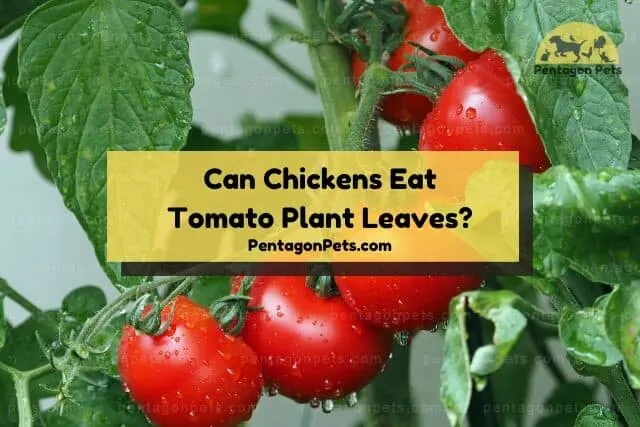
Chickens can be quite curious creatures, and they often peck at various plants and fruits in their environment. While tomatoes are a nutritious treat for chickens, the leaves of the tomato plant can be a different story.
Tomato plants are members of the nightshade family, which contains a natural toxin called solanine. Solanine is present in the leaves, stems, and unripe fruits of these plants. Ingestion of solanine can cause adverse effects in chickens, such as gastrointestinal upset, diarrhea, and vomiting.
Although chickens generally avoid consuming large amounts of greenery from tomato plants due to their bitter taste, it is still essential to keep a close eye on them. An excessive intake of tomato plant leaves can lead to potential health issues and, in extreme cases, even death.
To ensure the safety of your chickens, it is advisable to restrict their access to tomato plants within their environment. You can do this by fencing off the area where the plants are growing, or by moving the chickens to a different location. Additionally, providing your chickens with a diverse and balanced diet can also discourage them from consuming undesired foliage.
While tomatoes can be a healthy treat for chickens, it is crucial to prevent them from consuming the leaves of the tomato plant. By monitoring their environment and ensuring a well-rounded diet, you can protect your chickens from the potential hazards of ingesting solanine.
Can Chickens Eat Tomato Skins/Scraps?
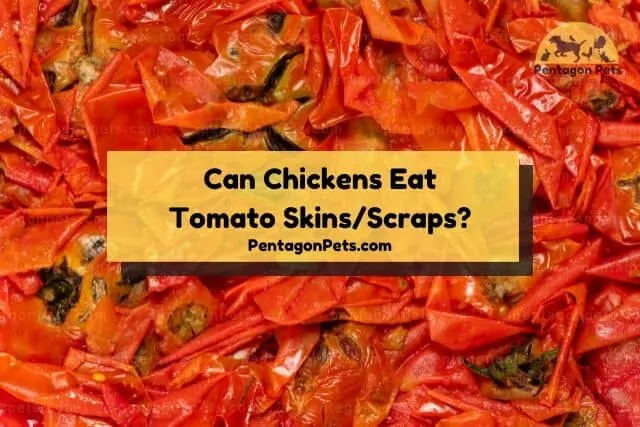
Chickens can safely eat tomato skins and scraps as long as they are ripe, red, and clean. Tomato scraps can be a healthy addition to a chicken’s diet because they are high in essential vitamins and minerals like vitamins A, C, and K, as well as potassium and antioxidants.
However, it is crucial to avoid feeding chickens unripe (green) tomatoes or parts of the tomato plant (leaves and stems). These contain a substance called solanine, which is toxic to chickens. Solanine can cause symptoms such as diarrhea, vomiting, and in severe cases, death.
When feeding chickens tomato scraps, ensure that you:
- Remove any green parts: Those parts might contain solanine.
- Wash the tomatoes thoroughly: This will remove pesticides or chemicals that can harm chickens.
- Chop the tomatoes into smaller pieces: Doing so makes it easier for chickens to consume and digest.
Tomato scraps can be an occasional treat partnered with some other vegetable offerings such as:
- Cucumber
- Carrots
- Leafy greens
Although tomato scraps are a healthy addition, it is essential to maintain a balanced diet for chickens. The primary diet should consist of 90% layer feed, providing them all their necessary nutrients, and the remaining 10% can comprise vegetables, fruits, and other treats.
Can Chickens Eat Tomato Seeds?
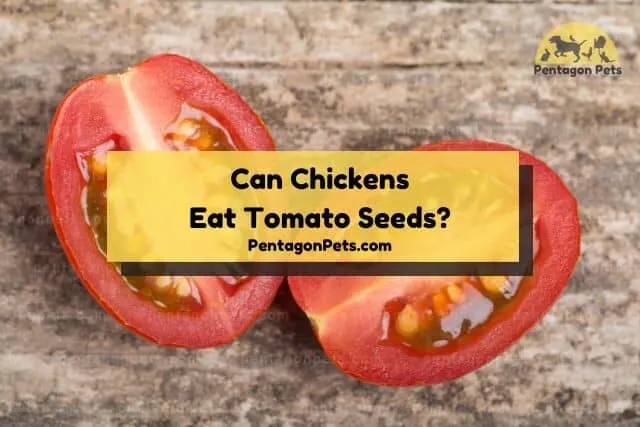
Chickens can indeed eat tomato seeds without any significant health risks. Tomato seeds are small and soft, making them easy for chickens to consume and digest. Additionally, the seeds provide a source of nutrients, including vitamins, minerals, and fiber, which can contribute to a well-rounded diet for the chickens.
It is essential to note that while tomato seeds are generally safe for chickens to eat, the green parts of the tomato plant, such as the leaves and stems, contain a toxic substance called solanine. This compound can be harmful to chickens if consumed in large amounts. Therefore, it is best to avoid feeding chickens the green parts of tomato plants.
When feeding tomatoes to chickens, it is recommended to cut the tomatoes into smaller pieces, ensuring that any green parts have been removed. This will make it easier for the chickens to consume and digest the tomato as well as limit their exposure to the toxic solanine.
In moderation, tomatoes can be a healthy and enjoyable treat for chickens. Including tomato seeds in their diet can offer variety and additional nutrients. However, as with any treat, it is essential to maintain a well-balanced diet of proper chicken feed, supplemented by fresh fruits, vegetables, and greens, to promote optimal health and well-being for your feathered friends.
Can Chickens Eat Tomato Sauce?
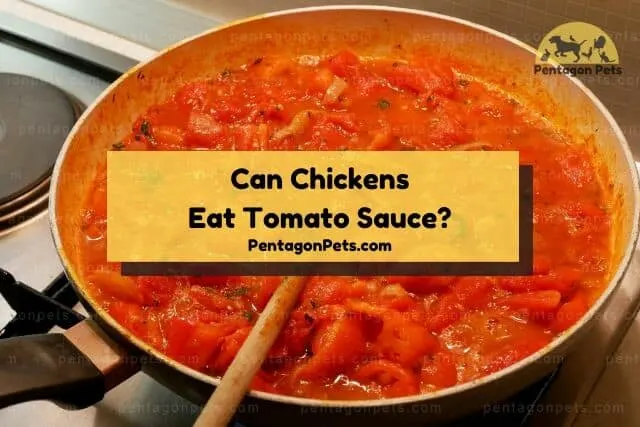
Chickens can eat tomato sauce, but it is not the best choice for their diet. Tomato sauce typically contains added sugars, salt, and preservatives that may not be suitable for a chicken’s nutritional needs. The high salt content, in particular, can be harmful to chickens as they are susceptible to kidney problems when consuming too much sodium.
It’s important to consider that chickens primarily thrive on a diet of grains, seeds, and insects. While vegetables and fruits, such as tomatoes, can provide beneficial nutrients and variety to their diet, processed tomato products like sauce are not ideal.
One risk associated with feeding chickens tomato sauce is the potential for exposure to toxic substances. Tomatoes, especially the green parts, contain a toxic substance called solanine that can harm chickens. Although tomato sauce is usually made from ripe tomatoes without green parts, it’s better to err on the side of caution and avoid feeding chickens this potentially unsafe product.
Another concern is the risk of overfeeding. Chickens enjoy a variety of foods and might quickly develop a taste for tomato sauce, leading to an imbalanced diet. Ensuring your chickens have a well-rounded diet with proper nutrients is crucial for their overall health and egg production.
To summarize, while chickens may technically eat tomato sauce, it is not recommended due to the added sugars, salt, and preservatives, as well as the potential for exposure to toxic substances. Focus on providing a balanced diet with natural, whole food sources, including vegetables and fruits like fresh, ripe tomatoes, for a healthier and happier flock.
Can Chickens Eat Tomato Hornworms?
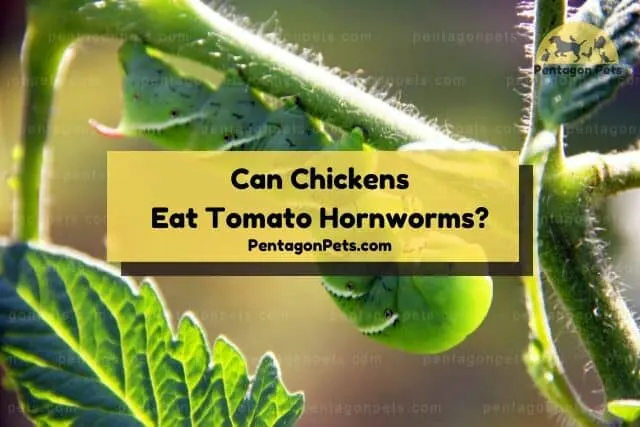
Chickens are known for their ability to consume a variety of insects and pests within their environment. One such common pest is the tomato hornworm. Chickens can indeed eat tomato hornworms, and doing so can provide some benefits for both the chickens and the garden.
First, chickens actively foraging for insects, including hornworms, can help control pest populations in a garden. This natural pest control supports healthier plants and reduces the need for chemical pesticides. Moreover, hornworms and other similar insects can provide valuable protein sources for chickens, promoting their health and egg production.
However, there are some considerations to keep in mind when allowing chickens to consume tomato hornworms. It is essential to monitor the overall health and well-being of the chickens. If they start displaying any signs of illness or distress, it may be necessary to limit or discontinue their access to hornworms.
In addition, hornworms consuming pesticide-treated tomato plants might pose a potential risk to chickens. Pesticides can accumulate in the hornworms, and in turn, when chickens eat these hornworms, they might be exposed to harmful chemicals. To ensure the safety of the chickens, it is crucial to opt for organic gardening practices or provide a safe space for chickens to forage away from treated plants.
Chickens can eat tomato hornworms, and doing so can offer both pest control and nutritional benefits. However, it is crucial to monitor the health of the chickens and ensure they are not exposed to pesticide-contaminated insects.
Can Chickens Eat Cooked Tomato?
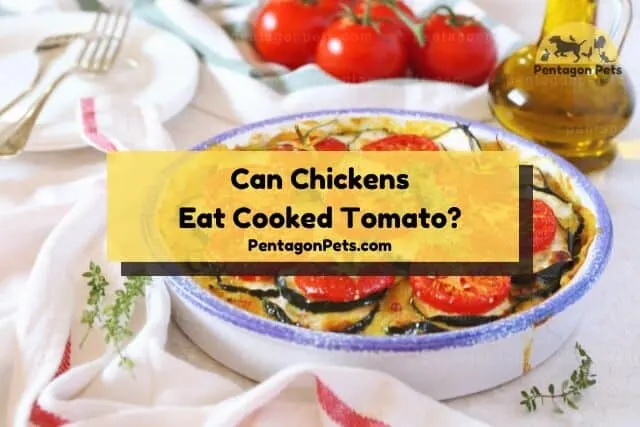
Chickens generally enjoy a wide variety of fruits and vegetables in their diet, and cooked tomatoes can certainly be included. However, it’s essential to consider a few factors to ensure their safe consumption.
Firstly, when providing cooked tomatoes to your chickens, make sure that they’re prepared without any harmful ingredients such as salt, onions, and garlic. These ingredients can negatively impact the chickens’ health and should be avoided.
Secondly, cooked tomatoes should be cut into small and manageable pieces for the chickens. Smaller pieces can help prevent choking and make it easier for them to consume. Also, make sure the cooked tomatoes have cooled down to an appropriate temperature before providing them to the flock, as hot foods can burn their sensitive mouths.
Lastly, it’s important to note that chicken diets should be balanced, and cooked tomatoes, like any other food, should be given in moderation. A well-balanced diet for chickens includes high-quality poultry feed, fresh water, and a limited amount of vegetables and fruits as treats or supplements. While cooked tomatoes can be a nutritious part of their diet, excessive amounts can lead to health concerns, such as reduced egg production.
This article was first published on August 15, 2023 by Pentagon-Pets.
Chickens can safely consume cooked tomatoes provided they are prepared without harmful ingredients and given in moderation. Take care to serve them in small pieces and at an appropriate temperature to ensure a safe and enjoyable treat for your flock.
Can Chickens Eat Green Tomatoes?
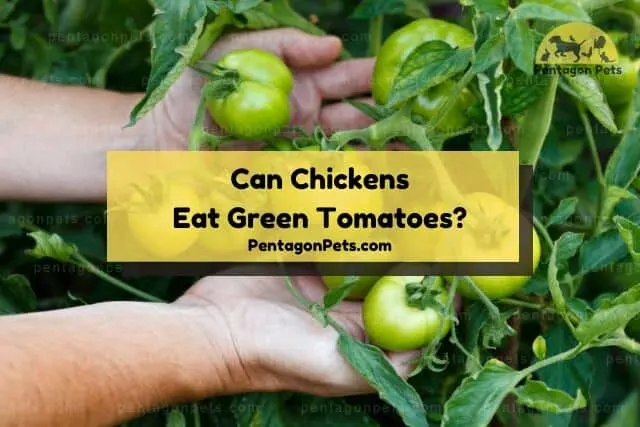
Chickens can eat ripe tomatoes without any issues, as they offer vitamins A and C, as well as antioxidants like lycopene. However, green tomatoes are a different story. Green tomatoes contain a substance called solanine, which can be toxic to chickens if consumed in large quantities. Solanine is part of the nightshade family, which includes plants such as potatoes, eggplants, and peppers.
In small amounts, solanine is not likely to cause any harm to your chickens. However, regularly feeding them green tomatoes or allowing them access to large amounts would be risky. The effects of solanine poisoning in chickens include gastrointestinal distress, diarrhea, difficulty breathing, and paralysis.
It is essential to keep in mind that chickens have a natural ability to recognize unsafe food. They possess an instinct to avoid plants that might be harmful to them. Although chickens can sometimes eat small amounts of green tomatoes without any ill effects, it is better to err on the side of caution.
To ensure the safety of your chickens, consider feeding them ripe tomatoes instead. Be sure to chop the tomatoes into smaller pieces for easy consumption, and always remove the stems and leaves, as these parts of the tomato plant also contain solanine.
Pentagon Pet is the owner of this article that was first published on August 15, 2023.
It is not recommended to feed green tomatoes to chickens due to the presence of solanine, a potentially toxic substance. Providing ripe tomatoes as an occasional treat would be a safer and healthier option for your flock.
Can Chickens Eat Raw Tomatoes?
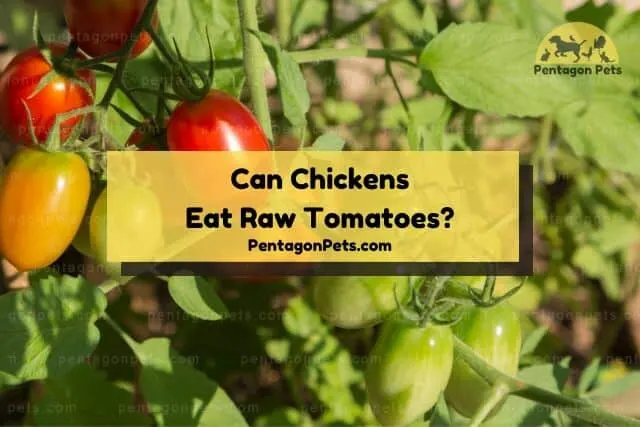
Chickens can indeed eat raw tomatoes as part of their diet. Tomatoes provide essential nutrients such as vitamins A, C, and K, as well as the antioxidant lycopene. These nutrients can support the chicken’s immune system, improve egg production, and maintain overall health.
When feeding tomatoes to chickens, it is essential to ensure that the tomatoes are ripe and not green. This is because green tomatoes contain solanine, a toxin that can be harmful to chickens if ingested in large quantities. In small amounts, the toxin will not pose a significant risk, but it is better to stay on the safe side and provide ripe tomatoes to your chickens.
Serving Tomatoes to Chickens
To feed chickens raw tomatoes, follow these steps:
- Choose ripe tomatoes: Make sure to select ripe tomatoes, characterized by their bright red color and firm texture. Avoid any with green patches.
- Wash the tomatoes: Clean the tomatoes thoroughly to remove any dirt, pesticides, or bacteria.
- Cut into small pieces: Chop the tomatoes into small, manageable pieces that your chickens can easily peck at. Remove any stems or leaves.
When feeding tomatoes to your chickens, keep the following tips in mind:
- Remove uneaten tomatoes: To avoid attracting pests or encouraging the growth of mold, promptly remove any uneaten tomato pieces from the coop.
- Provide in moderation: While tomatoes can be a healthy snack, chickens should not consume them as their primary food source. Ensure that the majority of their diet consists of formulated chicken feed, which provides all the essential nutrients required for optimal growth and egg production.
Chickens can safely consume raw tomatoes as long as they are ripe and provided in moderation. Following the steps above will ensure that your flock enjoys a healthy and tasty treat that can contribute positively to their overall well-being.
Can Chickens Eat Tomato Vines?
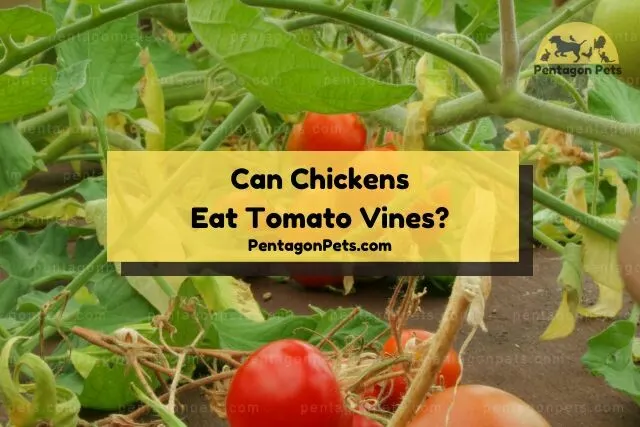
Chickens can safely consume ripe tomatoes, but it is not recommended for them to eat tomato vines. Tomato plants, including the vines, are part of the nightshade family. This family of plants contains a compound called solanine which can be toxic to chickens.
Solanine toxins in tomato vines are not present in the fruit itself, so feeding ripe tomatoes to chickens will not pose a risk. However, excessive consumption of the vines or leaves could lead to digestive issues or other health concerns.
To avoid potential problems stemming from solanine ingestion in chickens, remove the vines and leaves before offering ripe tomatoes to the flock. Instead of giving them entire tomato plants, a good practice is to cut the ripe tomatoes into smaller pieces, making them easier for the chickens to eat.
At the same time, consider offering a variety of healthy and safe treats for your chickens, such as:
This article and its contents are owned by Pentagon Pets and was first published on August 15, 2023.
- Fruits: Apples, berries, melons, and grapes
- Vegetables: Leafy greens, squash, peas, and carrots
- Grains: Cooked rice, oats, and barley
Being cautious in what you feed your chickens is important, as it helps ensure their well-being and longevity. Keep tomato vines out of their reach, and continue providing them with a balanced diet that meets their nutritional needs.
